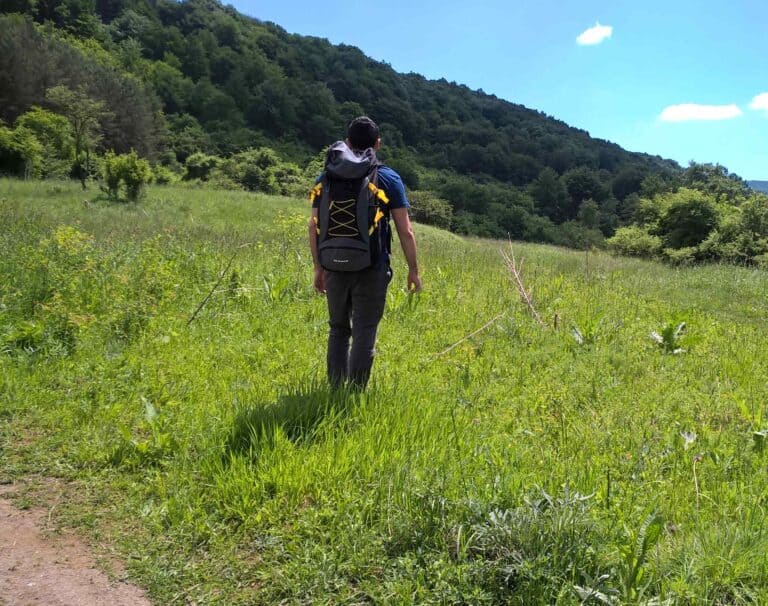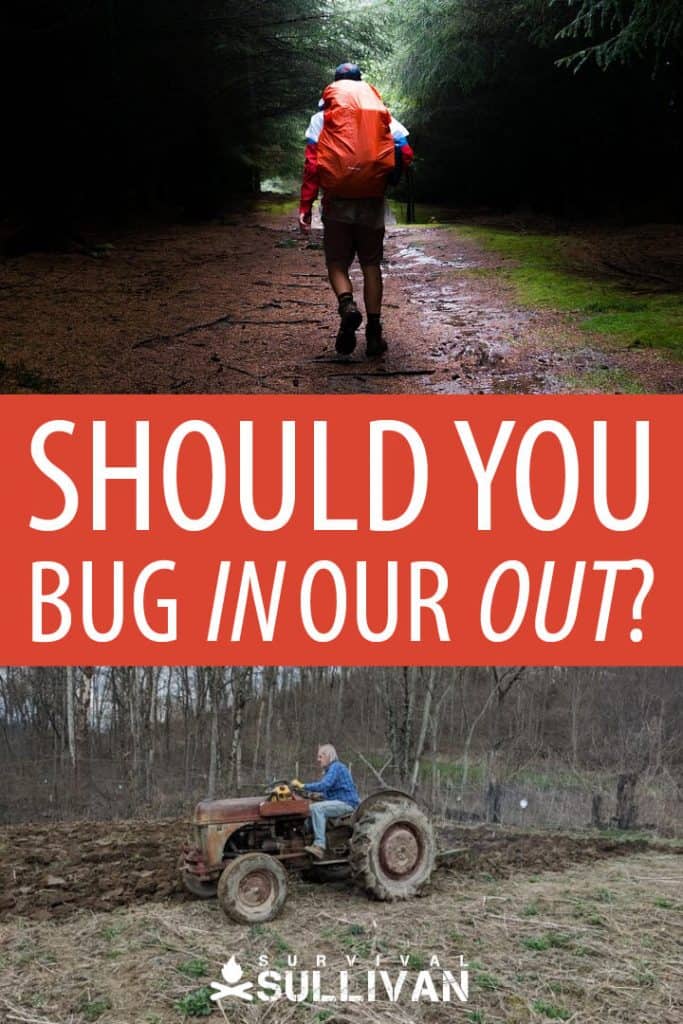When a natural or man-made disaster strikes, you basically have two choices: either stay inside until it’s all over and done. Or take your stuff, as much as you can carry, and get as far away as possible.
Though most preppers have a choice in mind, bugging in or bugging out may not, in fact, be up to you. Circumstances might force you to do one or the other.

I would say about 80% of people would rather bug in than bug out, and for very good reasons. You may already have large food and water stockpiles, and your home defense systems in place, but the most important thing is bugging in means you don’t have to risk your life going out into the unknown.
Bugging out in most cases is the more dangerous option, simply because of the unknown elements. Anything can happen. You have less control if you bug out than if you stay put in your own home.
Table of Contents
Additional Reasons Not to Bug Out
- You’ll need to leave a lot of your stockpiled supplies at home
- You or a family member may have limited mobility or a disability that makes travel more difficult
- It’s harder to stay warm and prevent hypothermia while on the run
- The situation away from home could be worse
- Sleeping at home where you are comfortable is easier
- You have young children, especially infants or toddlers who will make moving quickly and quietly much more difficult
- Being on the move can make you a target
- Injuries are more likely when on the move and are harder to treat effectively
- You have livestock and other animals you are raising for food that will have to be simply left behind if you bug out
On the other hand, no matter how well you prepared for a bug-in, if your town or city is compromised, you won’t have a choice but to bug out. In such cases, your home may become a death trap and hunkering down could prove fatal.
So, even if you do decide to bug in initially, you might have to bug out at some point when things are taking a turn for the worse. So how do you know whether you’ll be bugging in or out?
Well – and this is very important – the right decision is not something you make now, it’s something you will make when it happens. The best things you can do right now are:
- to prepare for both
- and to learn how to quickly make the right decision as soon as you hear news that it’s happening.
You see…
Bugging in Is Easy
My take on it is (one that you might not like) you should prepare for both. You see, bugging in is easy. It’s comfortable. THAT’S WHY SOME PEOPLE PREP FOR IT.
Reasons People Prefer Bugging In:
- you primarily have to buy food and gear (we all love shopping, right?)
- you don’t need to learn a ton of new skills such as starting a fire, building shelter, hunting, fishing etc. (well, you do need some skills because you’re going to need to raise farm animals or start a survival garden but most people don’t realize that)
- you don’t have to be in very good shape because you won’t have to run for your life (though you will need to be fit for the post-SHTF life)
- you don’t have that much planning to do, the most complicated thing being required is rotating your food stockpile
My concern is that people who prep primarily to bug in tend to overlook all of these additional aspects, survival fitness being one of them. So if they do have to bug out, they probably won’t make it very far.
In a survival situation, if something can go wrong, it will. The rule of law may be suspended but Murphy’s Law sure won’t.
OK, let’s first figure out when you should bug in and when you should bug out…
When to Bug In
You may want to bug in if you’re dealing with:
- riots and social unrest
- an economic collapse
- an EMP
- heavy snow
- a heat wave
- a food crisis
- extended power outages
Note that if you don’t have large stockpile or the means to live self-sufficiently, you may want to leave your location at some point and get to a shelter or another place that can sustain you.
In case of a long-term disaster, you’re going to need a way to sustain yourself and your family. If your home can’t do that, you may have to start now by putting some additional resources in place or start planning how to relocate to another location that can sustain you.
When to Bug Out
You may want to bug out if you’re dealing with:
- war
- pandemic
- nuclear meltdown
- a hurricane
- a chemical spill
- volcanic eruption
- any other reason that would make your area uninhabitable for a long period
OK, let’s talk about some specific things to do in both scenarios…
Preparing to Bug In
Now, I said bugging in is easy but it’s still a lot of work. Here are some of the things you should do:
- start a food and water stockpile and rotate it every 6 months;
- consider alternate ways to light and power your home in a grid-down situation;
- set up a rainwater catchment system to supplement you’re existing water supply;
- think about ways to keep trash to a minimum;
- focus primarily on foods that require little or no cooking. You don’t want to attract hungry neighbors;
- have alternate ways of keeping warm;
- have means to generate and store electricity;
- focus on home defense. Establish a safe room to hide as a last resort;
- think about alternate ways of cooking for the long term;
- get to know your neighbors or like-minded families in the area to form a mutual aid group
- reinforcing the exterior of your home with additional security, reinforced doors and locks, and defensive landscaping.
- also for the long term, consider a survival garden, an aquaponics system, or raising farm animals such as chickens, sheep and goats;
- Ensure that the perimeter of your property is secure against intruders by installing fencing or other methods to keep unwanted people from venturing closer to your home.
- Establish lookout points and defense points throughout your property in the event you and your group need to defend against intruders.
Preparing to Bug Out
Here are some of the things you can do in case you need to bug out:
- Have a bug out bag or an INCH bag ready for each member of your family and your pets.
- Be sure to include a comprehensive first aid kit in your bug out bag that includes extra doses of any personal medications.
- Know all the ways to get out of your town or city, particularly the ones less traveled. You may even consider the train tracks, logging trails, or power line easements as a bug out route.
- Print detailed maps of the area and either laminate them or store them in Ziploc bags.
- Learn bush-craft skills such as making a shelter, starting a fire, fishing, and hunting.
- Get into shape, you’re gonna need it.
- Establish rally points for your family since some of them may not be home when it happens.
- Focus on becoming a gray man. When you’re out there, you need to keep a low profile, you need to cover your tracks, to make sure you’re not spotted as you’re cooking outdoors, collecting firewood, foraging, patrolling the campsite perimeter, etc.
- Have a bug out vehicle and even a back-up to it. For example, your primary vehicle can be a 4X4 bugout truck while your secondary one can be a fold-able bike inside the trunk. Expect to abandon your primary vehicle if needed to keep moving.
- Compartmentalize your bug out supplies. If you have to abandon your bug out vehicle and set out on your bike or on foot, you can do so quickly and know that you have your most critical supplies.
- Speaking of which, make sure you have a car bug out bag and that your vehicle is properly equipped for a journey full of perils. Your car bug out bag should contain spare fuses, extra hoses and belts, spark plugs, as well as replacement fluids for brake, power steering, windshield washer, and radiator fluid. Anything you may need to keep your vehicle moving should be in your car bug out bag, including an operator’s manual for your vehicle.
- Take your bug out bag for a test drive to see how long you can walk with it on your back. Even better, bring your groceries home in a backpack instead of taking the car just to make sure you can carry it when it’s full.
- Make sure you know what to do and how to communicate if you or a loved one gets separated from your group.
- Know where to camp and how to set up perimeter early alerts and defenses.
- Learn how to find water and several ways to filter and purify it.
- Mark various “bug out locations”on your map that could shelter you for a few hours or even overnight if need be. Take the time to bury several supply caches near those locations in the event you arrive without your bug out bag.
- Know without a doubt which plants in your local area are edible and which are poisonous. Be very familiar with how to properly prepare wild edibles safely, including which ones have medicinal properties.
- Learn how to protect yourself from wild animals as well as people.
- Wear the right clothes and shoes to keep you warm, including hiking boots, the right clothing fabrics such as wool and polyester, long-sleeved tops and pants to keep bugs and the stinging nettle from harming you or, on the contrary, have shorts, t-shirts, sunglasses, sunscreen, and a baseball cap or a bandanna to bug out in extreme heat).
- Plan for ways to monitor weather updates and activity updates while on the move.
- Make a plan to communicate with family or group members if you are separated.
What If You Can Do Either One?
What if you can choose between bugging in or out? Say you’ll face Martial Law. In this case, you can bug in or out, but it all boils down to where you’ll be more comfortable and safer, well fed, and protected. To figure it out, let me give you a few scenarios:
- If you’re pregnant or you have a toddler, it’s probably best to bug in.
- If your secondary location will allow you to live a cheaper life (because it’s self-sustainable), you may want to move there.
- If your home is easy to defend and you have enough guns, ammo, and willpower, you’ll probably want to stay.
- If you’re a very good driver, have a great car, know all the routes in and out of your town or city, bugging out might be easier for you than for most preppers.
- If you have means to live self-sufficiently + a big food stockpile, you should probably bug in.
- If your home is in the middle of a crowded city, it may become a target. You should probably leave.
- If you estimate the disaster won’t last more than 1-2 weeks and your life isn’t in any kind of danger, you should stay.
- If you know a lot of preppers in your town and you have close ties with them, you may want to bug in. You’ll be able to help each other and even protect each other if need be.
One More Thing…
Just because you bugged in, that doesn’t mean it’s all over. You may be forced to bug out eventually because, oftentimes, just when you think things are getting better, they take a turn for the worse.
What are YOUR plans, do you think you’re most likely to bug in or out when it hits?

updated 10/10/2019 by Megan Stewart

My dad was military. My grandfather was a cop. They served their country well. But I don’t like taking orders. I’m taking matters into my own hands so I’m not just preparing, I’m going to a friggin’ war to provide you the best of the best survival and preparedness content out there.

Hello Dan Sullivan, enjoyed your article and here’s why. Although I’m pretty well set in my preps I always like to read these types of posts to insure that I have dotted my I’s and crossed my T’s.
I’m about 90% there in my preps.
I don’t really anticipate a long SHTF event but I could be mistaken on that and have tried to prep for the long term.
I will bug in for two reasons. At 53 YRO my body has been beat up by a life long work of carpentry/millwright work and I doubt if I would have the stamina to run a mile or two. Oh, I could walk a couple of miles at a good ciip and do fine but at a run, no way! And i’m not fat either. At 6’3″ and 200 lbs you’d think I’d be in better shape but the type two diabetes really takes it’s toll.
And secondly, I am a ornery SOB and prefer to stick and fight for my property.
I do have other contingency plans where there is water, freeze dried food and fuel hidden close by that I can access within a short 5 minute walk but I worry about my fellow preppers who live in a much more urban environment.
To me, those are the persons who really need to be prepared with a bug out bag although I do think it’s prudent to have some water, extra clothing, flashlight, fire making material and dehydrated food or MRE’s in a knapsack to get you where you are going in a pinch. Oh, and don’t forget some extra dried dog food in you BOB if you have a dog. Don’t worry about the cats, they can forage for themselves but a dog is a super good early warning system.
Again, thanks for posting your thoughts!
Best,
Snake Plisken